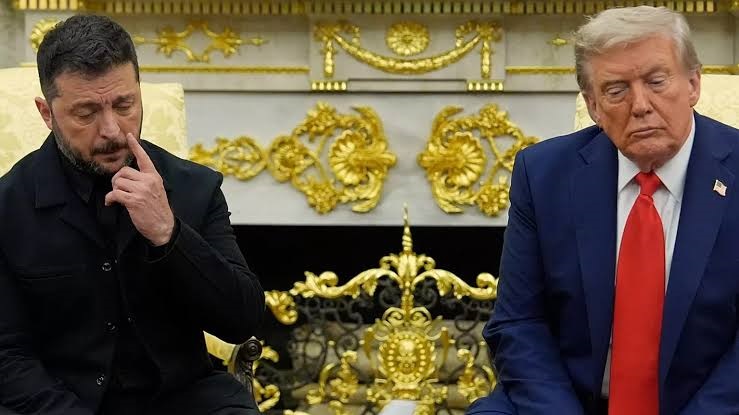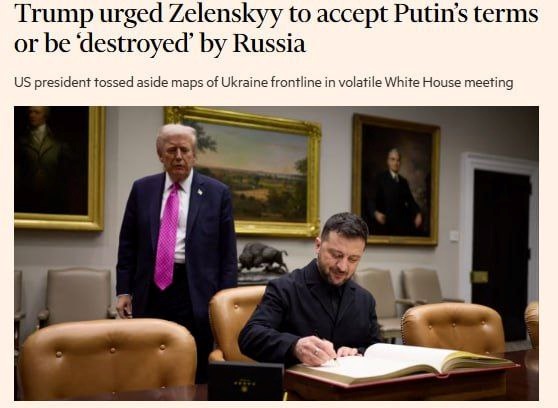 Trump and Zelenskyy
Trump and Zelenskyy
Photo: AP
President Trump is betting that one more round of personal diplomacy will deliver a breakthrough in the more than three-year-long war in Ukraine after months of failed peace negotiations, ‘The Wall Street Journal’ writes.
Behind the scenes, Trump’s team is working to back up the president’s leader-to-leader negotiations with more diplomatic leverage than he exerted in his August summit with Russian President Vladimir Putin. Those efforts will be put to the test when Trump meets with Putin in Budapest in the coming weeks.
Trump’s decision to organize another high-profile summit with Putin isn’t without risk. Trump’s previous meeting with the Russian leader ended without concrete success and was widely seen as a win for Moscow. Trump has so far been reluctant to ratchet up pressure on Putin, and the president’s critics worry that another summit allows Russia to buy more time to execute its war plans.
Hoping to lay the groundwork for an agreement, the U.S. is planning more lower-level meetings with Russia than were held before the Alaska talks, according to administration officials. The U.S. side will be led by Secretary of State Marco Rubio instead of special envoy Steve Witkoff.
Ukrainian Zelensky left a White House meeting with Trump Friday without a U.S. commitment to provide long-range Tomahawk missiles, which have a range of more than 1,000 miles and could reach targets deep inside Russia.
Trump, who cast himself as the “mediator president.”
Even within the administration, officials have taken note of Trump’s hesitation to push Putin, who so far has shown little interest in concessions needed to make a deal. The White House has put more pressure on Kyiv than on Moscow, one administration official noted.
“There are tools to put more pressure on the Russians economically and militarily — and we’re not using them,” said Daniel Fried, a former U.S. assistant secretary of state for Europe.
Fresh off brokering the Gaza cease-fire, U.S. officials expressed optimism that the momentum of one peace agreement could pave the way for another. In the Middle East, Trump declared a successful peace deal while critical details of how to implement it were still unfinished.
But the negotiations with Russia will require a different approach, according to current and former U.S. officials and analysts with experience in the region. Russian officials are focused on process and traditional diplomacy, said Samuel Charap, a veteran Russia watcher and senior political analyst at Rand.
“Trump’s impatience has not allowed a working-level process yet to take hold, and that makes it hard to judge whether, in fact, we are at a moment where it’s Putin’s intransigence that is the core problem,” Charap said. The elevation of Rubio sends a message to Russia that the U.S. is engaged in a process they understand and are comfortable with, analysts say.
In his second term, Trump has reveled in the title of “President of Peace,” brandishing his “peace through strength” approach as proof that sheer willpower can push through deals that end wars. He says he has resolved eight wars, a disputed claim.
He has repeatedly expressed surprise that Russia’s war in Ukraine has been the most intractable. “I thought it would be the easiest,” he said last month, “because of my relationship with President Putin. But he’s let me down.”
As Trump’s frustration with Putin has mounted, administration officials have indicated they are considering more tools to pressure Russia.
In recent months, the U.S. has expanded intelligence sharing with Ukraine to strike targets inside Russia and imposed steep tariffs on India, one of Russia’s top trading partners. Speaking earlier this week at NATO, Defense Secretary Pete Hegseth promised “firepower” was coming to Ukraine through U.S. weapons.
Meanwhile, the White House has privately been working with lawmakers who wish to move forward with legislation giving Trump broad authority to enact Russian sanctions.
Some current and former Trump aides said that the president’s maneuvering around Russia has achieved more than the administration has gotten credit for.

Donald Trump urged Volodymyr Zelenskyy to accept Russia’s terms for ending its war in a volatile White House meeting on Friday, warning that Vladimir Putin had said he would “destroy” Ukraine if it did not agree, ‘Financial Times’ writes.
The meeting between the US president and the Ukrainian descended many times into a “shouting match”, with Trump “cursing all the time”, people familiar with the matter said.
The tense meeting echoed a similarly fractious encounter at the White House in February, in which Trump and Vice-President JD Vance lambasted Zelenskyy for what they characterised as a lack of gratitude towards the US.
During Friday’s meeting, Trump appeared to have adopted many of Putin’s talking points verbatim, even when they contradicted his own recent statements about Russia’s weaknesses, said European officials briefed on the meeting.
According to a European official with knowledge of the meeting, Trump told Zelenskyy that the Ukrainian leader needed to cut a deal or face destruction.
The official said that Trump told Zelenskyy he was losing the war, warning: “If [Putin] wants it, he will destroy you.”
Trump’s belligerent repetition of Putin’s rhetoric on Friday dashed hopes among many of Ukraine’s European allies that he could be convinced to increase support to Kyiv.
That hope had risen after Trump in recent weeks expressed frustration and impatience with the Russian president’s refusal to actively engage in bilateral peace negotiations with Zelenskyy.
Three other European officials briefed on the White House discussions confirmed that Trump had spent much of the meeting lecturing Zelenskyy, repeating Putin’s arguments about the conflict and urging him to accept the Russian proposal.
“Zelenskyy was very negative” following the meeting, according to one of the officials, adding that European leaders were “not optimistic but pragmatic with planning next steps”.
read more in our Telegram-channel https://t.me/The_International_Affairs

 12:26 21.10.2025 •
12:26 21.10.2025 •






















